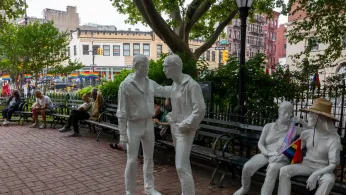
4 hours ago
House Democrats Demand Reversal of National Park Service Edits Erasing LGBTQ+ and Marginalized Histories
READ TIME: 3 MIN.
On Friday morning, a coalition of more than 70 House Democrats, spearheaded by Representatives Dan Goldman of New York, Mark Takano of California, and Ritchie Torres of New York, issued a sharply worded letter to Interior Secretary Doug Burgum and Acting National Park Service (NPS) Director Jessica Bowron. The lawmakers are demanding the immediate reversal of recent edits that they describe as a “blatant attack on the integrity of public history,” particularly targeting changes at the Stonewall National Monument and other significant sites .
The letter, which was obtained by The Advocate, denounces an escalating trend of what the lawmakers call “rewriting history across national parks.” The members allege that the Trump administration’s directives have resulted in the removal or dilution of references to LGBTQ+ Americans, Japanese American incarceration during World War II, Native American massacres, and the history of slavery from official park interpretations and signage .
The immediate catalyst for this congressional action was the National Park Service’s recent removal of references to transgender and queer Americans from interpretive materials and digital content at the Stonewall National Monument in New York City. The monument, established in 2016, commemorates the 1969 Stonewall Rebellion—a pivotal moment in the LGBTQ+ rights movement. The omitted content reportedly included references to the leadership of transgender activists such as Marsha P. Johnson and Sylvia Rivera, who played crucial roles in the uprising .
In their letter, the lawmakers demand the immediate restoration of these references, stating, “The deliberate omission of transgender and queer Americans from the Stonewall narrative is not only a disservice to the LGBTQ+ community, but an affront to the truth of our shared national history.”
The lawmakers’ concerns are not limited to the Stonewall site. They point to a growing pattern of historical omissions across the National Park Service. Among the examples cited are:
- The removal of educational signs in Acadia National Park that detailed the experiences of the Wabanaki people and the impacts of climate change, following directives from Interior Secretary Burgum .
- Edits that downplay or erase references to the incarceration of Japanese Americans during World War II and the massacre of Native American communities .
- Changes to the interpretation of sites connected to the history of slavery, which some historians and advocates say risk obscuring the lived realities of Black Americans .
The House Democrats’ letter also raises alarms about a recent NPS directive that encourages public feedback on “negative” portrayals of American history at park sites. The lawmakers allege that this move opens the door to politically motivated pressure campaigns that could further distort historical narratives. They have requested a formal briefing from the Department of the Interior on how the agency intends to handle such feedback and ensure that public history remains accurate and inclusive .
LGBTQ+ advocates and historians have responded with alarm to these developments. The Stonewall National Monument holds deep cultural and symbolic significance for LGBTQ+ people in the United States and globally. The erasure of transgender and queer histories from its official interpretation, advocates say, represents a dangerous precedent that could extend to other marginalized groups .
Mark Takano, one of the lead signatories and the first openly gay person of color elected to Congress, emphasized that “telling the full truth about Stonewall, and all of our shared history, is essential to justice and inclusion.”
The National Parks Conservation Association and other advocacy groups have warned that these changes are part of a broader federal effort to “whitewash” American history and diminish recognition of the contributions and struggles of marginalized communities .
As of publication, spokespeople for the Department of the Interior and the National Park Service have not responded to requests for comment from national media outlets. Many communications staff remain furloughed due to the ongoing government shutdown, further complicating oversight and public accountability .
Interior Secretary Doug Burgum, in a recent interview, has downplayed concerns about the administration’s approach to public lands and historical interpretation, attributing operational challenges to the ongoing budget impasse in Congress .
The current clash over historical interpretation in the National Park Service reflects deeper national debates about how America remembers its past and whose stories are elevated. LGBTQ+ leaders and allies in Congress continue to push for a transparent and inclusive approach to public history—one that recognizes the leadership and contributions of transgender people, people of color, and other historically marginalized groups.
The outcome of this dispute is likely to shape not only the narratives presented at iconic sites like Stonewall but also the broader trajectory of how history is told across federal lands and national monuments. For the LGBTQ+ community and its allies, the stakes are clear: representation in public history is not just a matter of accuracy, but of justice and belonging .






